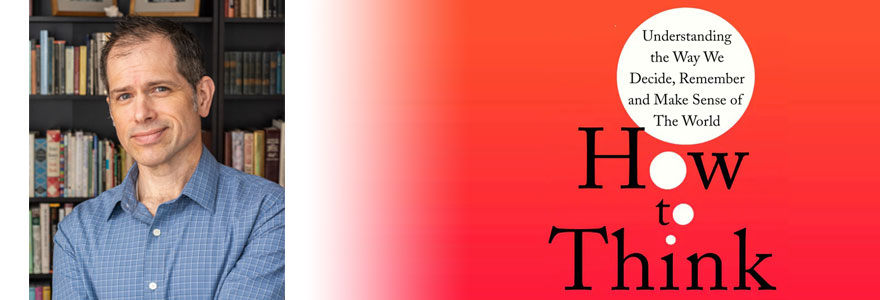News and Updates
Contact
Faculty of Social Science
Social Science Centre
Room 9438
Western University
T. 519-661-2053
F. 519-661-3868
E. social-science@uwo.ca
New book asks people to consider how to think
April 30, 2021
Story by Rob Rombouts
When John Paul Minda was 16, he was in trouble. He was driving his father’s truck, veered off the side of the road, and smashed the passenger side window against something.
Thinking back now, nearly 40 years later, Minda is not sure why he drifted to the side of the road. In fact, at the time, he was not sure what happened. Perhaps, he thought, he moved to avoid oncoming traffic. This seemed like a sensible reason, and this is what he told his dad.
But is that what happened? And is it important? When Minda thinks about the event now, he does not really think about the accident itself. Instead, he is thinking about his story about the event.
“What we often end up remembering is the act of remembering itself more so than the event. Each time we remember an event (or remember the remembering of an event) it is subject to some possible change,” Minda writes in his book, How to Think: Understanding the Way We Decide, Remember and Make Sense of the World.
The book is a popular science, non-academic approach to explaining cognitive-psychology, -science, and –neuroscience, and how it affects your everyday life. Minda, a professor in the Department of Psychology, calls upon personal stories, and recent events to highlight how the brain and mind work.
“Everything you do will be informed by your past and your memories,” he said. “And the decisions you make are impacted by things you’ve done before.”
In one example, Minda points to Bill de Blasio, Mayor of New York City, who, in March 2020, as the COVID-19 pandemic was setting in around the world, encouraged New Yorkers to go out on the town and enjoy the city.
“He gave some of the worst possible advice concerning the corona virus,” said Minda, “but he was echoing Giuliani after 9/11 and was likely relying on the memory of what a mayor of New York should do when the city is in crisis. He did the same thing, but it completely back-fired.”
To Minda, de Blasio’s actions were a good example of how using your memory, even if it is the only memory you have, can seem like a good match, but can backfire.
“It’s useful to know how people’s individual history constrains the way, and the kinds of things, they can think about,” said Minda.
The book deals with diverse topics in the field including behavioural economics, cognitive psychology, perception, neuroscience, and social psychology. Through the book, Minda references recent discoveries and research in the fields of cognitive psychology and neuroscience, including research from his colleagues in the Department of Psychology and the Brain and Mind Institute, such as Jody Culham, Mel Goodale and Adrian Owen.
Through the book, Minda tries to make the concepts approachable to a general audience, to give people a way to understand how cognitive psychology will help them understand how they think, behave and interact with people the way they do.
“One of the big take home messages is that a lot of the mistakes people make commonly – errors with memory, judgment, decision making, and problem solving – a lot of them come from the same place,” he said. “They come from a knowledge or cognitive system that mostly works well to allow us to run through problems quickly. A lot of the error and mistakes we make are signs that the system is working well.”
How to Think: Understanding the Way We Decide, Remember and Make Sense of the World was published in the UK by Little, Brown and is available for purchase in the United Kingdom and the European Union, and as paperback or e-book. It is being translated and released in China, Japan, South Korea Turkey, and Brazil. It is available as an e-book in Canada now, and will be published in North America later in 2021.

